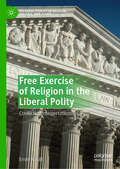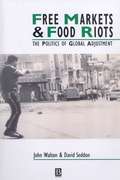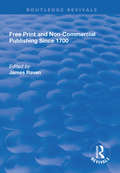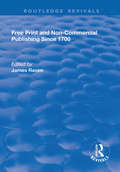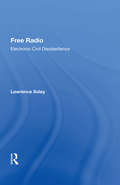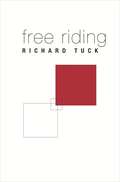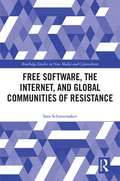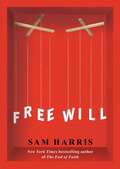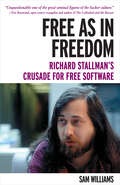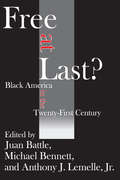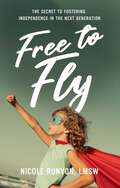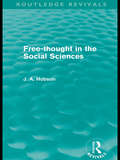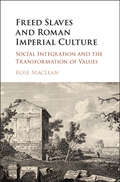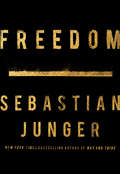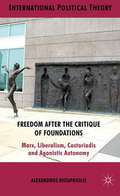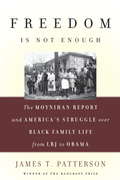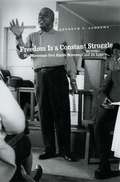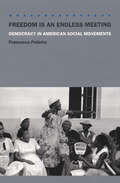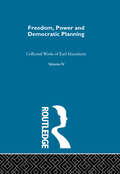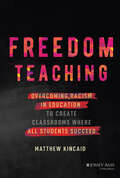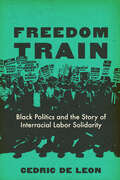- Table View
- List View
Free Exercise of Religion in the Liberal Polity: Conflicting Interpretations (Palgrave Studies in Religion, Politics, and Policy)
by Emily R. GillThis book addresses the challenge of providing for the free exercise of religion without allowing religious exercise by some individuals and groups to impinge upon the conscientious convictions of others. State neutrality toward religion is impossible, because neutrality means inattention to religion for some, but leveling the playing field through accommodations or exemptions for others. Both formal and substantive neutrality have a place in addressing particular conflicts. One such example is public funding for religiously affiliated social service programs, for which neither type of neutrality is satisfactory and thus some restrictions are justifiable; conversely, private voluntary organizations that do not receive direct public funding should be allowed wide latitude regarding their practices. This title also examines the expansive free exercise claims that are now made by those who argue that following the law impinges upon their beliefs, as exemplified by the ministerial exception and the Hobby Lobby and Masterpiece Cakeshop Supreme Court cases. It concludes by analyzing the relationship between neutrality and marriage as a civil status, which impacts a variety of commitment types and plural marriage.
Free For All: Why The NHS Is Worth Saving
by Gavin FrancisBritain's health service is dying. Gavin Francis shows us why we should fight for it.Since its birth in 1948, the powers that be have chipped away at the NHS. Now, Britain's best-loved institution is under greater threat than ever, besieged by a deadly combination of underfunding, understaffing and the predatory private sector.In the wake of the pandemic, we have come to accept a 'new normal' of permanent crisis and years-long waiting lists. But, as Gavin Francis reveals in this short, vital book- it doesn't have to be this way, and until recently, it wasn't. Drawing on the history of the NHS as well as his own experience as a GP, he introduces us to the inner workings of an institution that has never been perfect but which transformed the lives and health of millions, for free - and which has never been more important. For those who believe in the future of the NHS and its founding principles, this is essential reading from the bestselling author of Recovery and Intensive Care.
Free Markets and Food Riots: The Politics of Global Adjustment (IJURR Studies in Urban and Social Change Book Series #64)
by John K. Walton David SeddonThis book describes and explains the extraordinary wave of popular protest that swept across the so-called Third World and the countries of the former socialist bloc during the period from the late 1970s to the early 1990s, in response to the mounting debt crisis and the austerity measures widely adopted as part of economic "reform" and "adjustment". Explores this general proposition in a cross-national study of the austerity protests, or the 'IMF Riots' that have affected so many debtor nations since the mid-1970s Argues that modern austerity protests, like the classical "bread riots" in eighteenth-century Europe are political acts aimed at injustice, but acts that are an integral part of the process of international economic and political restructuring Evaluates how modern food riots are most important for what they reveal about global economic transformation and its social, and political, consequences Provides a general framework (drawing on comparative and historical material) and then trace the cycle of uneven development, debt, neo-liberal reform, and protest in Latin America, Africa, Asia, the Middle East, and Eastern Europe Focusses on the role of women in structural adjustment and protest politics and the features of seemingly anomalous cases which qualify the general argument
Free Print and Non-commercial Publishing Since 1700
by James RavenThis title was first published in 2000: The essays in this collection re-examine the phenomenon of "free print" in print culture. By focusing on free print the volume offers perspectives in the cultural history of textual transmission from the early-18th century to the mid-20th century. "Publishing" in the sense of making the print public, embraces the free and often unsolicited distribution of religious literature, political propaganda, and civic and personal gifts. The free print examined here includes gift-books; advertisements and commemorations; the promotion of knowledge, institutions and services; commercial and philanthropic lobbying; religious and missionary activity; and political propaganda both official and underground. Broad issues range from the consideration of press finances, government intervention, and private and institutional patronage, to textual familiarity and social ritual. The approach is deliberately comparative. Ten established scholars of book and printing history, who look at very different regions and periods, test the nature of the alleged authority of print and the apparent value of the commercial tag through the study of print which arrives unbidden in the hands of its consumers. The chapters in this volume are based on papers first given at the "Print for Free" conference organized by the Cambridge Project for the Book Trust in September 1996.
Free Print and Non-commercial Publishing Since 1700
by James RavenThis title was first published in 2000: The essays in this collection re-examine the phenomenon of "free print" in print culture. By focusing on free print the volume offers perspectives in the cultural history of textual transmission from the early-18th century to the mid-20th century. "Publishing" in the sense of making the print public, embraces the free and often unsolicited distribution of religious literature, political propaganda, and civic and personal gifts. The free print examined here includes gift-books; advertisements and commemorations; the promotion of knowledge, institutions and services; commercial and philanthropic lobbying; religious and missionary activity; and political propaganda both official and underground. Broad issues range from the consideration of press finances, government intervention, and private and institutional patronage, to textual familiarity and social ritual. The approach is deliberately comparative. Ten established scholars of book and printing history, who look at very different regions and periods, test the nature of the alleged authority of print and the apparent value of the commercial tag through the study of print which arrives unbidden in the hands of its consumers. The chapters in this volume are based on papers first given at the "Print for Free" conference organized by the Cambridge Project for the Book Trust in September 1996.
Free Radio: Electronic Civil Disobedience (Critical Studies In Communication And In The Cultural Industries)
by Lawrence SoleyThis book reviews the history of the microradio movement, enabling readers to understand why and how it has captured momentum and power. It discusses the anti-Nazi underground stations and other resistance stations, explaining how previous stations provided vehicles for democratic communications.
Free Riding
by Richard TuckOne individual’s contribution to a large collective project—such as voting in a national election or contributing to a public television fund-raising campaign—often seems negligible. A striking proposition of contemporary economics and political science is that it would be an exercise of reason, not a failure of it, not to contribute to a collective project if the contribution is negligible, but to benefit from it nonetheless. But Richard Tuck wonders whether this phenomenon of free riding is a timeless aspect of human nature or a recent, historically contingent one. He argues for the latter, showing that the notion would have seemed strange to people in the nineteenth century and earlier and that the concept only became accepted when the idea of perfect competition took hold in economics in the early twentieth century. Tuck makes careful distinctions between the prisoner’s dilemma problem, threshold phenomena such as voting, and free riding. He analyzes the notion of negligibility, and shows some of the logical difficulties in the idea—and how the ancient paradox of the sorites illustrates the difficulties. Tuck presents a bold challenge to the skeptical account of social cooperation so widely held today. If accepted, his argument may over time encourage more public-spirited behavior.
Free Software, the Internet, and Global Communities of Resistance: Hacking the Global (Routledge Studies in New Media and Cyberculture)
by Sara SchoonmakerThis book explores software's pivotal role as the code that powers computers, mobile devices, the Internet, and social media. Creating conditions for the ongoing development and use of software, including the Internet as a communications infrastructure, is one of the most compelling issues of our time. Free software is based upon open source code, developed in peer communities as well as corporate settings, challenging the dominance of proprietary software firms and promoting the digital commons. Drawing upon key cases and interviews with free software proponents based in Europe, Brazil and the U.S., the book explores pathways toward creating the digital commons and examines contemporary political struggles over free software, privacy and civil liberties on the Internet that are vital for the commons' continued development.
Free Will
by Sam HarrisFrom the New York Times bestselling author of The End of Faith, a thought-provoking, "brilliant and witty" (Oliver Sacks) look at the notion of free will—and the implications that it is an illusion.A belief in free will touches nearly everything that human beings value. It is difficult to think about law, politics, religion, public policy, intimate relationships, morality—as well as feelings of remorse or personal achievement—without first imagining that every person is the true source of his or her thoughts and actions. And yet the facts tell us that free will is an illusion. In this enlightening book, Sam Harris argues that this truth about the human mind does not undermine morality or diminish the importance of social and political freedom, but it can and should change the way we think about some of the most important questions in life.
Free as in Freedom [Paperback]: Richard Stallman's Crusade for Free Software
by Sam WilliamsFree as in Freedom interweaves biographical snapshots of GNU project founder Richard Stallman with the political, social and economic history of the free software movement. It examines Stallman's unique personality and how that personality has been at turns a driving force and a drawback in terms of the movement's overall success.Free as in Freedom examines one man's 20-year attempt to codify and communicate the ethics of 1970s era "hacking" culture in such a way that later generations might easily share and build upon the knowledge of their computing forebears. The book documents Stallman's personal evolution from teenage misfit to prescient adult hacker to political leader and examines how that evolution has shaped the free software movement. Like Alan Greenspan in the financial sector, Richard Stallman has assumed the role of tribal elder within the hacking community, a community that bills itself as anarchic and averse to central leadership or authority. How did this paradox come about? Free as in Freedom provides an answer. It also looks at how the latest twists and turns in the software marketplace have diminished Stallman's leadership role in some areas while augmenting it in others.Finally, Free as in Freedom examines both Stallman and the free software movement from historical viewpoint. Will future generations see Stallman as a genius or crackpot? The answer to that question depends partly on which side of the free software debate the reader currently stands and partly upon the reader's own outlook for the future. 100 years from now, when terms such as "computer," "operating system" and perhaps even "software" itself seem hopelessly quaint, will Richard Stallman's particular vision of freedom still resonate, or will it have taken its place alongside other utopian concepts on the 'ash-heap of history?'
Free at Last?: Black America in the Twenty-first Century
by Anthony J. Lemelle Juan Battle Michael BennettAs this volume indicates, the issues facing black America are diverse, and the tools needed to understand these phenomena cross disciplinary boundaries. In this anthology, the authors address a wide range of topics including race, gender, class, sexual orientation, globalism, migration, health, politics, culture, and urban issues-from a diversity of disciplinary perspectives.
Free to Fly: The Secret to Fostering Independence in the Next Generation
by Nicole RunyonIn Free to Fly, Nicole Runyon reveals how today&’s technology is crippling our kids' development, and she offers parents a clear path to reclaim their children&’s mental health, build resilience, and foster true independence in the next generation.Every day, news headlines scream about the mental-health crisis in the United States, especially among youth. Anxiety, depression, and suicide are at record levels, and parents are desperate to seek treatment for their children. They recognize that the kids are not alright but don&’t know how to help. In two-plus decades of working as a child therapist, author Nicole Runyon, LMSW, has seen the devastating effect technology is having on today&’s young people. From social media and gaming addiction to pornography and sextortion, children&’s innocence and health are being demolished by their virtual realities. In Free to Fly, Nicole will show you where we&’ve gone wrong and how to get back on track, by sharing essential info such as the four parts of child development, and how technology use impacts each stage the ways children have become disconnected from other people, and from themselves the reasons discomfort is critical to resilience, in both parents and children strategies for creating boundaries around your child&’s technology use why therapy isn&’t always the answer Yes, technology is here to stay. But so are you! No one has greater influence on children than their parents. And this book will equip you to determine when and how technology is part of your child&’s life, empowering you to make informed decisions. It&’s never too late to make choices that will benefit not only your child but also your entire family.
Free-Thought in the Social Sciences (Routledge Revivals)
by J. A. HobsonThis Routledge Revival sees the reissue of a seminal work by British economist, sociologist and academic John A. Hobson, elucidating his views on a variety of topics across the social sciences. He makes particular reference to the struggle between the disinterested urge of the social scientist and the interests and other motive forces which tend to influence and mould his processes of inquiry. The work is split into three parts, focussing upon free-thinking, economics and political ethics respectively.
Freed Slaves and Roman Imperial Culture: Social Integration And The Transformation Of Values
by Rose MacLeanDuring the transition from Republic to Empire, the Roman aristocracy adapted traditional values to accommodate the advent of monarchy. <P><P>Freed Slaves and Roman Imperial Culture examines the ways in which members of the elite appropriated strategies from freed slaves to negotiate their relationship to the princeps and to redefine measures of individual progress. Primarily through the medium of inscribed burial monuments, Roman freedmen entered a broader conversation about power, honor, virtue, memory, and the nature of the human life course. Through this process, former slaves exerted a profound influence on the transformation of aristocratic values at a critical moment in Roman history.<P> Examines freed slaves' impact on Roman cultural history.<P> Identifies new factors in the transformation of elite values under the Principate.<P> Combines analysis of inscriptions with close readings of literary texts.
Freedom
by Sebastian JungerA profound rumination on the concept of freedom from the New York Times–bestselling author of Tribe Throughout history, humans have been driven by the quest for two cherished ideals: community and freedom. The two don’t coexist easily; we value individuality and self-reliance yet are utterly dependent on community for our most basic needs. In this intricately crafted and thought-provoking book, Sebastian Junger examines the tension that lies at the heart of what it means to be human. For much of a year, Junger and three friends—a conflict photographer and two Afghan war vets—walk the railroad lines of the east coast of the United States. It is an experiment in personal autonomy, but also in interdependence. Dodging railroad cops, sleeping under bridges, cooking over fires and drinking from creeks and rivers, the four men forge a unique reliance on one another. In Freedom, Junger weaves his account of this journey with other topics: primatology and boxing strategy, the history of labour strikes and Apache renegades, the role of women in resistance movements, and the brutal reality of life on the Pennsylvania frontier. Written in exquisite, razor-sharp prose, the result is a powerful examination of the primary desire that defines us.
Freedom (Shortcuts)
by Nick StevensonFreedom is commonly recognized as the struggle for basic liberties, societies based upon open dialogue, human rights and democracy. The idea of freedom is central to western ideas of modernity, but this engaging, accessible book argues that if we look back at the history of the idea of freedom, then what we mean by it is far more contested than we might think. To what extent does freedom have a ‘social’ component, and how is it being reshaped by our dominant consumer society? This book represents a wake-up call to all those who thought our basic ideas of freedom were settled. Today, the West sees itself as having a crucial role to play in exporting freedom into the far regions of the world – but our own freedom seems more under threat than ever. Linking ideas of public and personal freedom, Stevenson explores complaints about ‘big brother’, the arrival of the business society and the erosion of democracy to show how our freedoms are far from secure. Seeking to affirm the importance of freedom, this book provides a compelling argument for linking it to other values such as equality and responsibility. Drawing upon a range of critical thinkers and perspectives, Stevenson asks what freedom will come to mean in the future, in a world that seems increasingly fragile, uncertain and insecure.
Freedom After the Critique of Foundations: Marx, Liberalism, Castoriadis and Agonistic Autonomy (International Political Theory)
by Alexandros KioupkiolisAn exploration of the contemporary re-conception of freedom after the critique of objective truths and ideas of an unchanging human nature, in which modern self-determination was grounded. This book focuses on the radical theorist Cornelius Castoriadis and the new paradigm of 'agonistic autonomy' is contrasted with Marxian and liberal approaches.
Freedom At Midnight: फ्रीडम ॲट मिडनाइट
by Larry Collins Dominique Lapierre“फ्रीडम ॲट मिडनाइट” हे पुस्तक भारताच्या स्वातंत्र्यसंग्रामाच्या शेवटच्या दिवसांचे आणि भारताच्या स्वातंत्र्य मिळविण्याच्या काळातील घटनांचे एक विस्तृत वर्णन आहे. हे पुस्तक 1947 सालच्या ऐतिहासिक घटनांचे, भारताची फाळणी, महात्मा गांधींची हत्या, आणि भारताचे पहिले पंतप्रधान पंडित जवाहरलाल नेहरू यांच्या कार्यांचे तपशीलवार वर्णन करते. लॉर्ड माउंटबॅटन यांची भारताच्या शेवटच्या व्हाईसरॉय म्हणून भूमिका देखील विस्तृतपणे मांडलेली आहे. डॉमिनिक लॉपिए आणि लॅरी कॉलिन्स यांनी अतिशय सखोल संशोधन करून आणि विविध साक्षात्कारांद्वारे हे पुस्तक लिहिले आहे, ज्यामुळे या काळातील घटनांचे जीवंत चित्रण उभे राहते. हे पुस्तक भारताच्या स्वातंत्र्याच्या इतिहासावरचे एक महत्त्वाचे साहित्य आहे, ज्यामध्ये अनेक न उलगडलेल्या गोष्टींचे वर्णन आहे. “फ्रीडम ॲट मिडनाइट” हे पुस्तक इतिहास प्रेमी, विद्यार्थी, आणि भारतीय स्वातंत्र्य चळवळीतील घटकांमध्ये रुची असलेल्या वाचकांसाठी एक अनिवार्य वाचन आहे.
Freedom Is Not Enough: The Moynihan Report and America's Struggle over Black Family Life -- from LBJ to Obama
by James PattersonOn June 4, 1965, President Lyndon Johnson delivered what he and many others considered the greatest civil rights speech of his career. Proudly, Johnson hailed the new freedoms granted to African Americans due to the newly passed Civil Rights Act and Voting Rights Act, but noted that "freedom is not enough. ” The next stage of the movement would be to secure racial equality "as a fact and a result. ” The speech was drafted by an assistant secretary of labor by the name of Daniel Patrick Moynihan, who had just a few months earlier drafted a scorching report on the deterioration of the urban black family in America. When that report was leaked to the press a month after Johnson’s speech, it created a whirlwind of controversy from which Johnson’s civil rights initiatives would never recover. But Moynihan’s arguments proved startlingly prescient, and established the terms of a debate about welfare policy that have endured for forty-five years. The history of one of the great missed opportunities in American history, Freedom Is Not Enough will be essential reading for anyone seeking to understand our nation’s ongoing failure to address the tragedy of the black underclass.
Freedom Is a Constant Struggle: The Mississippi Civil Rights Movement and Its Legacy
by Kenneth T. AndrewsNo part of the United States was more resistant to the civil rights movement and its pursuit of racial equality than Mississippi. Freedom Is a Constant Struggle explores the civil rights movement in that state to consider its emergence before the 1965 Voting Rights Act and its impact long after. Did the civil rights movement have a lasting impact, and, if so, how did it bring about change? Kenneth T. Andrews is the first scholar to examine not only the history of the movement but its social and political legacy as well. His study demonstrates how during the 1970s and '80s, local movements worked to shape electoral politics, increase access to better public schools, and secure the administration of social welfare to needy African Americans. Freedom Is a Constant Struggle is also the first book of its kind to detail the activities of white supremacists in Mississippi, revealing how white repression and intimidation sparked black activism and simultaneously undermined the movement's ability to achieve far-reaching goals. Andrews shows that the federal government's role was important but reactive as federal actors responded to the sustained struggles between local movements and their opponents. He tracks the mobilization of black activists by the NAACP, the creation of Freedom Summer, efforts to galvanize black voters, the momentous desegregation of public schools and the rise of all-white private academies, and struggles over the economic development of black communities. From this complex history, Andrews shows how the civil rights movement built innovative organizations and campaigns that empowered local leadership and had a lasting legacy in Mississippi and beyond. Based on an original and creative research design that combines extensive archival research, interviews with activists, and quantitative historical data, Freedom Is a Constant Struggle provides many new insights into the civil rights struggle, and it presents a much broader theory to explain whether and how movements have enduring impacts on politics and society. What results is a work that will be invaluable to students of social movements, democratic politics, and the struggle for racial freedom in the U.S.
Freedom Is an Endless Meeting: Democracy in American Social Movements
by Francesca PollettaThis &“excellent study of activist politics in the United States over the past century&” challenges the conventional wisdom about participatory democracy (Times Literary Supplement). Freedom Is an Endless Meeting offers vivid portraits of American experiments in participatory democracy throughout the twentieth century. Drawing on meticulous research and more than one hundred interviews with activists, Francesca Polletta upends the notion that participatory democracy is worthy in purpose but unworkable in practice. Instead, she shows that social movements have often used bottom-up decision making as a powerful tool for political change. Polletta traces the history of democracy from early labor struggles and pre-World War II pacifism, through the civil rights, new left, and women&’s liberation movements of the sixties and seventies, and into today&’s faith-based organizing and anti-corporate globalization campaigns. In the process, she uncovers neglected sources of democratic inspiration—such as Depression-era labor educators and Mississippi voting registration workers—as well as practical strategies of social protest. Polletta also highlights the obstacles that arise when activists model their democracies after nonpolitical relationships such as friendship, tutelage, and religious fellowship. She concludes with a call to forge new kinds of democratic relationships that balance trust with accountability, respect with openness to disagreement, and caring with inclusiveness. For anyone concerned about the prospects for democracy in America, Freedom Is an Endless Meeting will offer abundant historical, theoretical, and practical insights.
Freedom Power & Democ Plan V 4
by Karl MannheimFirst published in 1951. Routledge is an imprint of Taylor & Francis, an informa company.
Freedom Rising
by Christian WelzelThis book presents a comprehensive theory of why human freedom gave way to increasing oppression since the invention of states - and why this trend began to reverse itself more recently, leading to a rapid expansion of universal freedoms and democracy. Drawing on a massive body of evidence, the author tests various explanations of the rise of freedom, providing convincing support of a well-reasoned theory of emancipation. The study demonstrates multiple trends toward human empowerment, which converge to give people control over their lives. Most important among these trends is the spread of 'emancipative values', which emphasize free choice and equal opportunities. The author identifies the desire for emancipation as the origin of the human empowerment trend and shows when and why this desire grows strong; why it is the source of democracy; and how it vitalizes civil society, feeds humanitarian norms, enhances happiness, and helps redirect modern civilization toward sustainable development.
Freedom Teaching: Overcoming Racism in Education to Create Classrooms Where All Students Succeed
by Matthew KincaidBuild an anti-racist and culturally responsive school environment In Freedom Teaching, educator and distinguished anti-racism practitioner Matthew Kincaid delivers a one-stop resource for educators and educational leaders seeking to improve equity and increase the cultural responsiveness of their school. In this book, you’ll discover the meaning and fundamentals of anti-racist education and find a roadmap to reducing the impact of systemic racism in your classroom. The author offers skills and tools he’s developed over the course of his lengthy career teaching anti-racist ideas to educators, providing readers with strategies that are effective at both the individual teacher and collective school community level. Readers will also find: ● A thorough introduction to the idea of Freedom Teaching and creating an education system that works for all students ● Strategies for building and maintaining anti-racist schools and classrooms ● Important social justice lessons from unsung activists An indispensable resource for educators, educational leaders, and anyone who wants to actualize change in our education system, Freedom Teachingbelongs in the libraries of the parents and families of students and teachers in training hoping for a better understanding on anti-racist concepts and ideas.
Freedom Train: Black Politics and the Story of Interracial Labor Solidarity
by Cedric De LeonRevealing the central role of Black activists in spurring interracial solidarity in the US labor movement. Most accounts of interracial solidarity focus on white union activists. In Freedom Train, Cedric de Leon, a former organizer and elected leader in the US labor movement, argues that we can't comprehend the history of workers' triumphs in the United States without investigating the role of Black liberation. This book shows that, from the early twentieth century to the years immediately following the March on Washington and beyond, independent Black labor organizations have pushed the white labor movement toward a fierce and effective interracial solidarity. Drawing on the minutes, correspondence, and speeches of Black labor activists and organizations from 1917 to 1968, de Leon reveals that Black people have been the most ardent and consistent proponents of racial inclusion, leadership representation, and programs linking economic and racial justice. He also demonstrates how conflict and consensus among Black labor groups fueled the fight for solidarity, as different factions split and consolidated to form successive and sometimes competing Black labor organizations. Freedom Train centers the contributions of Black people to the multiracial unions we have today and demonstrates that internal conflict can be a source of strategic innovation and social movement success.
